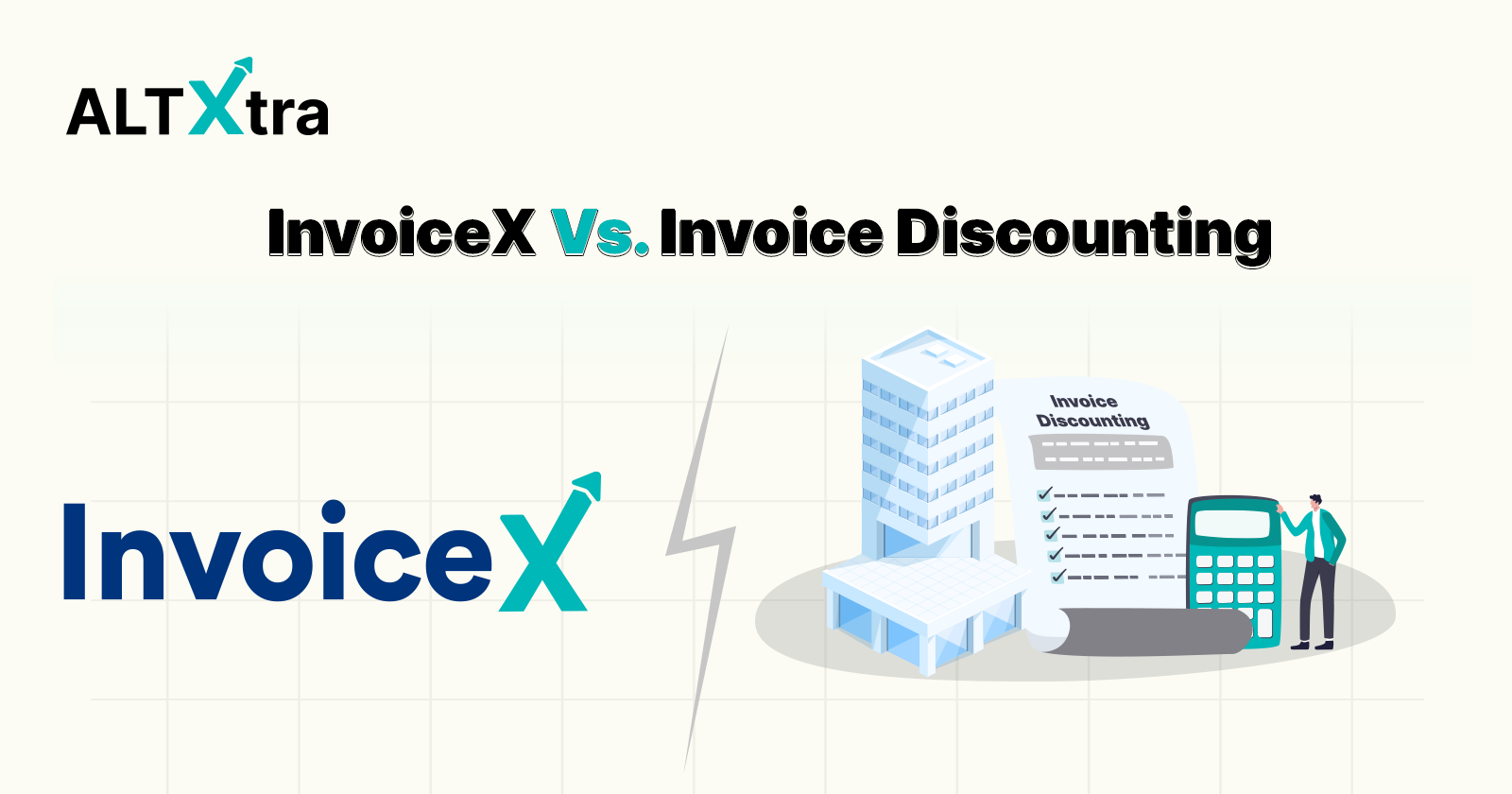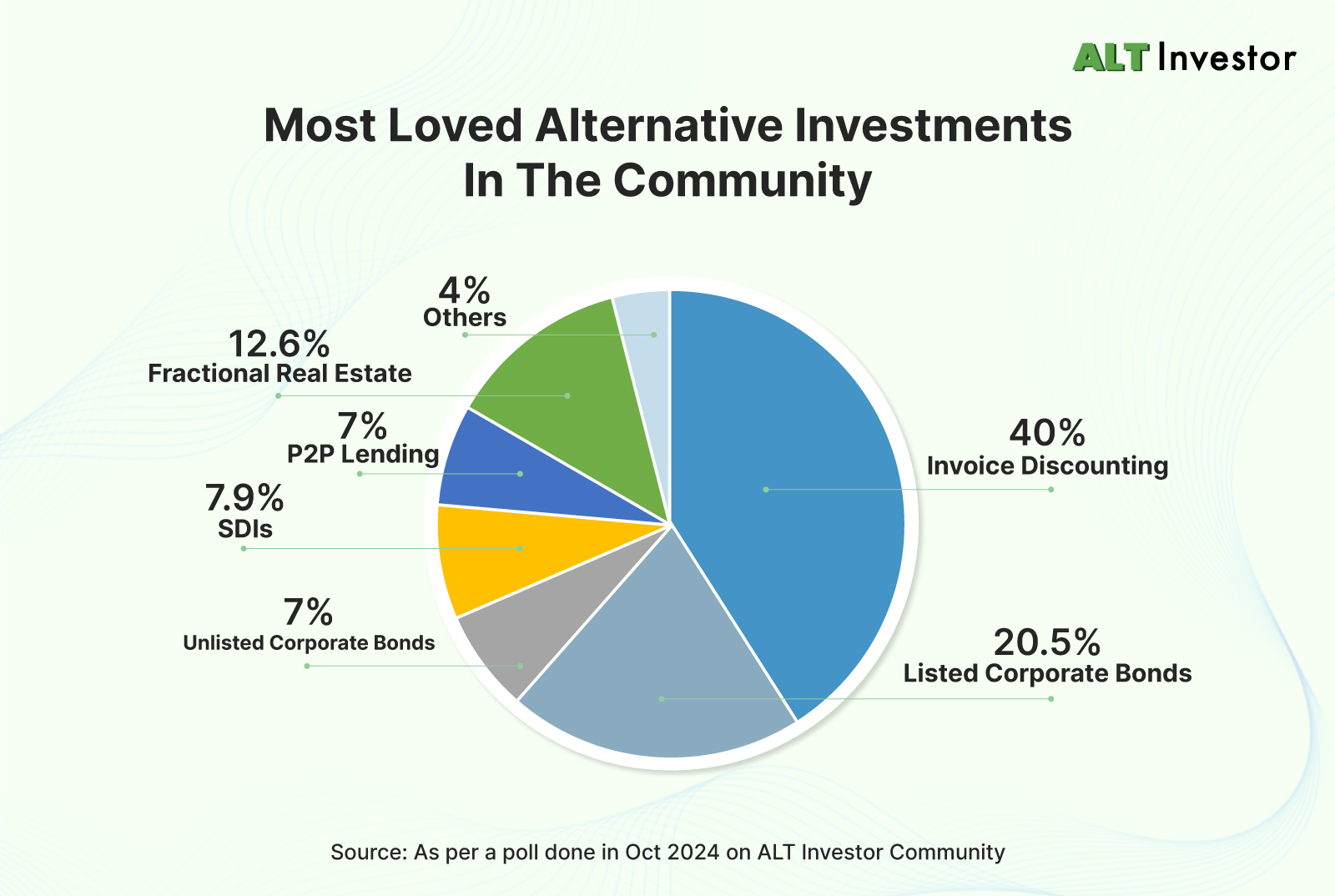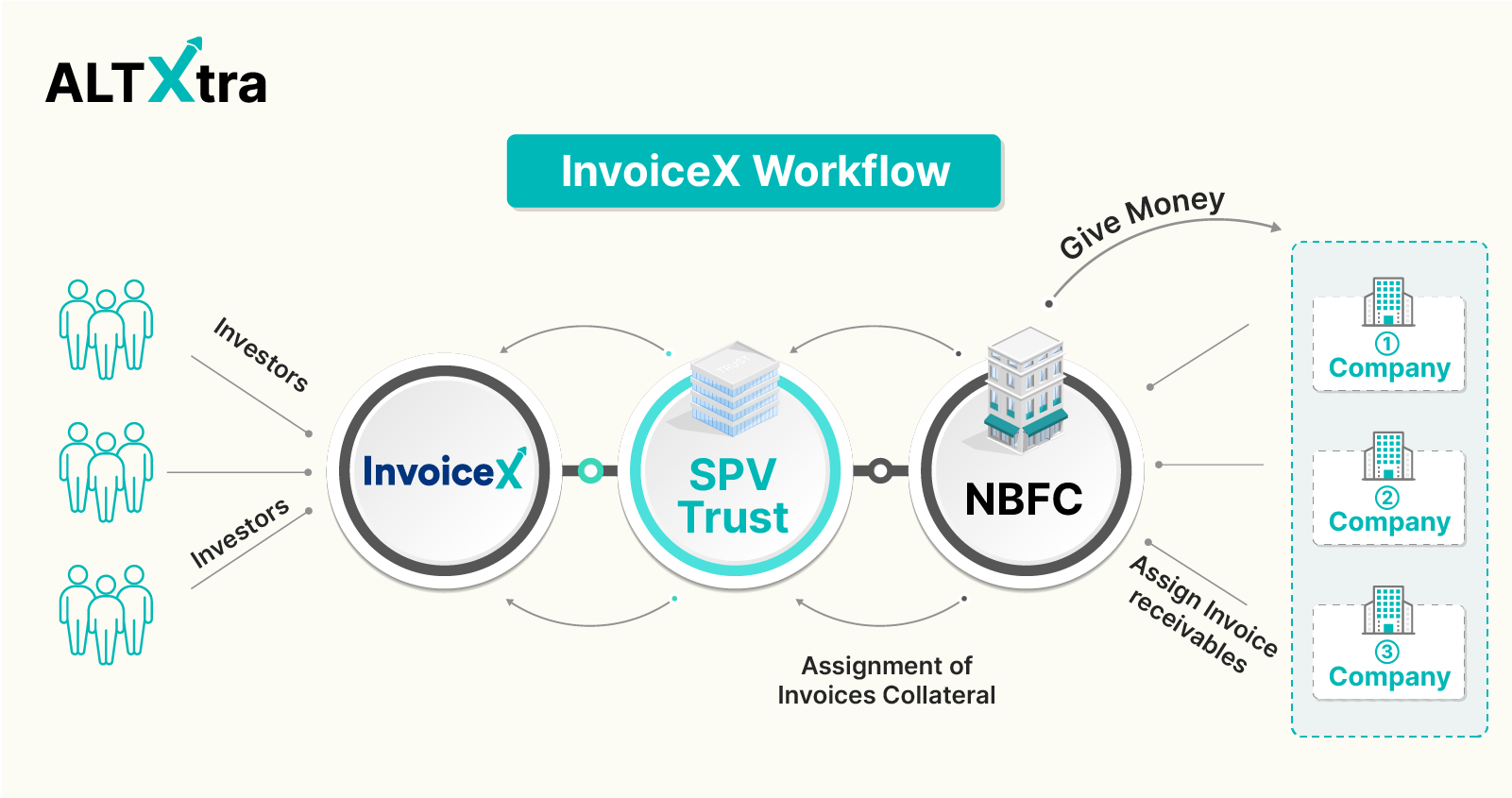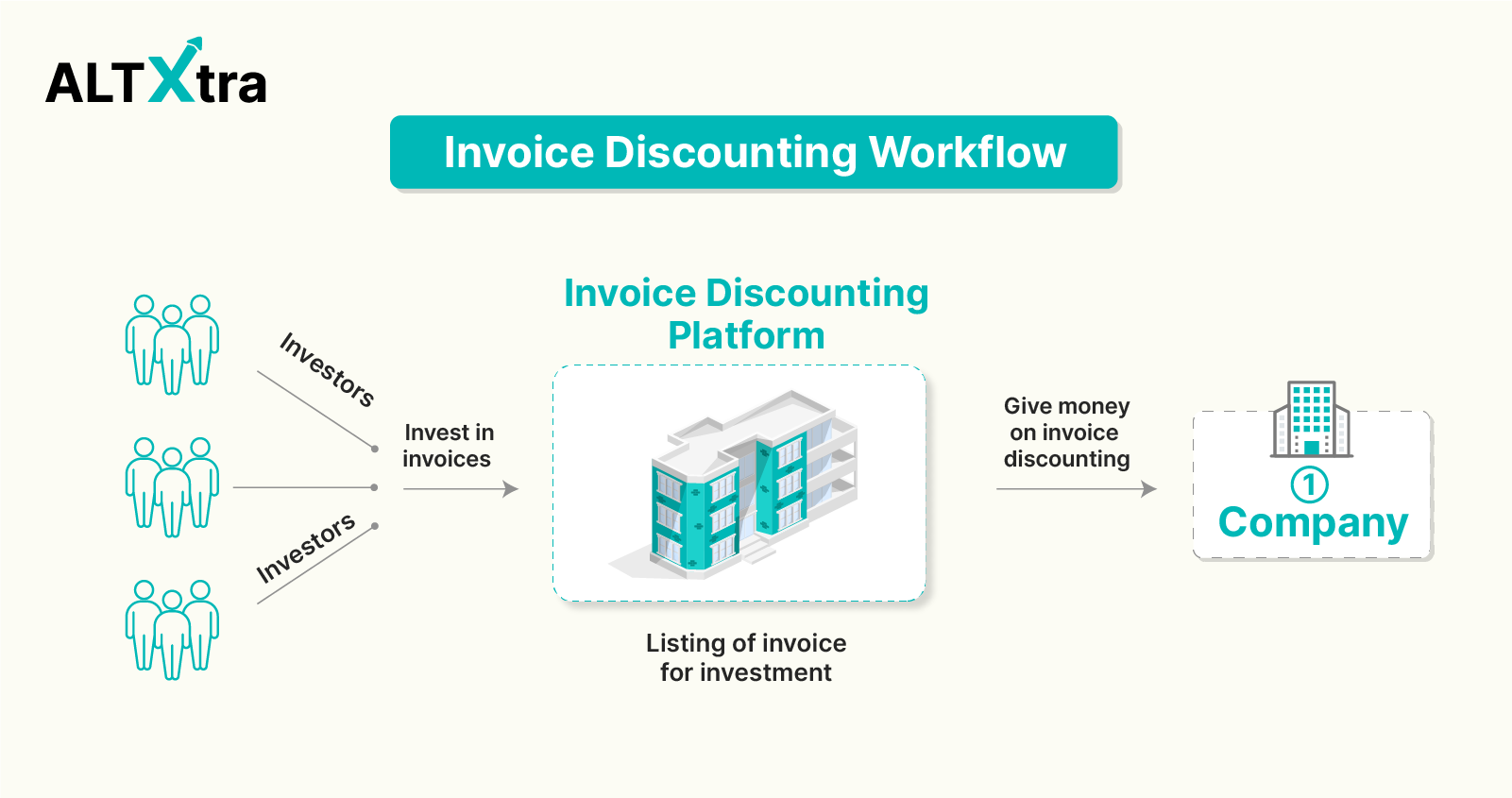InvoiceX Vs. Invoice Discounting: Where To Invest?
 Chahat Porwal
Chahat Porwal
KEY TAKEAWAYS
The article draws a fair comparison between the alternative investment option of invoice discounting with InvoiceX, a regulated product by Grip Invest.
InvoiceX offers a structured and secure investment option compared to traditional, unregulated invoice discounting, providing better risk-adjusted returns.
InvoiceX opportunities are credit-rated by SEBI-regulated agencies, offering transparency and risk assessment, whereas traditional invoice discounting requires investors to conduct their own risk analysis.
InvoiceX provides diversification across multiple buyers and sellers, while traditional invoice discounting typically involves a single buyer and seller, increasing risk.
InvoiceX offers liquidity options through DEMAT holdings, allowing trading via brokers, whereas traditional invoice discounting generally lacks liquidity options.
Hi there! Welcome to our ALTXtra series, where we decode alternative investments. Invoice Discounting is one of the most popular alternative investment avenues in this category and even within the ALT Investor community. Check this last poll we did, around 40% of the participants have their highest investments in invoice discounting. This is followed by corporate bonds at 21% and then by Fractional Real Estate at 13%.

In this article, we will do a fair comparison of InvoiceX, a regulated product launched by Grip Invest along with regular Invoice Discounting which is available on several other platforms.
Please note that InvoiceX is a Grip Invest’s branded product. When we mention InvoiceX in this article, you can think of it as an SDI backed by a pool of invoice receivables These types of products are sometimes available on other OBPP platforms as well. To read more about SDIs, please check this previous article in this series.
If you prefer watching in video format, checkout our latest video here:
Key Differences Between InvoiceX And Invoice Discounting (ID)
InvoiceX Workflow


| Characteristic | InvoiceX (SDI) | Invoice Discounting |
| Regulator | RBI and SEBI | Unregulated |
| Regulation | RBI: Securitisation of Standard Assets Directions, 2021 | Unregulated |
| SEBI: SEBI (Issue and Listing of Securitised Debt Instruments and Security Receipts) Regulations, 2008 | Unregulated |
Type Of Borrowers
InvoiceX is a pool of multiple invoices raised against blue-chip corporate companies, its all packaged into a single product. All of these invoices are discounted by large NBFCs or entities which are in this business from a long time. Some of these invoices may have a bank guarantee or a trade credit insurance as well, but it's very deal specific and users should study the deal pool before investing. RBI has put in place very specific criteria for these type of invoice discounting receivables that can be selected. These rules make InvoiceX a regulated product.
Invoice Discounting standalone is a one-to-one model. A platform may show multiple opportunities at any given time and an investor is free to choose the opportunity they want to invest into. A platform can choose to bring any invoice they deem fit on the platform as there are no specific rules around it. Some of these deals may also have invoices which maybe bank guaranteed or are insured. As an investor, you should scrutinize the deal documents and terms here even more as these are unregulated opportunities.
| Characteristic | InvoiceX (SDI) | Invoice Discounting |
| Source Of Loans | Originated by NBFC generally 10-15 years old and have robust credit-risk assessment processes. | The platform itself. |
| Secured/Unsecured | Secured with decent security structure | Unsecured unless bank guaranteed or trade credit insured |
Credit Rating Of Products
Invoice discounting is risky. If you lack enough protection and lose money on even one invoice, you could lose all your capital. So, it's fair to say there's a lot of credit risk in this product. Credit risk exists from both the buyer's and seller's perspectives. The buyer might not pay the invoice on time, or the seller might receive the payment but not pass it on to the investors who discounted the invoice.
Each InvoiceX opportunity must be rated by a SEBI-regulated rating agency like ICRA, CRISIL, IndiaRatings, etc. The agency publishes their rating rationale and methodology publicly, which everyone can read. Why is this important? Most of you investing may not be from the finance domain and may not be able to evaluate the risk of the security. The rating agency does that for you and provides you with a rating.
In Invoice Discounting, an investor should apply their own research and risk analysis techniques to assess the repayment ability. Some platforms share invoice data, copies of goods delivered receipts, and other financial data, but most don't. This makes it very difficult to assess the risk of an opportunity.
| Characteristic | InvoiceX (SDI) | Invoice Discounting |
| Credit Rated | Yes, overall rating assigned to the loan pool by agencies like ICRA, CRISIL, etc. | None |
Security Structure
This is probably the most important point, so I will break it down further:
InvoiceX: The product has several security features, such as:
Cash Collateralization: The NBFC which has discounted the invoices usually posts a certain percentage of the overall invoice value discounted to cover any defaults in the pool.
Excess Interest Spread: Typically, the NBFC discounts the invoice at a higher rate than what is passed on to the trust and investors. For example, if the NBFC discounts invoices at 12% interest and passes on 11% to investors in the form of InvoiceX, the extra 1% buffer can be used to cover any NPAs if needed and repay investors.
Overcollateralization: Let's say the total discounted invoices are at INR 112 Crore, but a InvoiceX product is created for only INR 100 Crore. The remaining INR 12 Crore is kept as collateral within the trust, posted by the NBFC. If Non-Performing Assets (NPA) increase, the interest and principal repayments from these extra loans are used so the investor doesn't face a default.
Securitization Rules: The NBFC cannot post invoice receivables into the pool that are already Non-Performing Assets. They also need to hold the discounted invoice for a defined time (by SEBI) before they are allowed to securitize it. This ensures they provide quality invoices are present in the pool.
Invoice Discounting: This is completely unsecured. However, in recent times, platforms have come up with a secured invoice discounting structure through various structures like:
Trade Credit Insurance: Trade Credit Insurance (TCI), also known as accounts receivable insurance, is a type of policy that protects businesses against the risk of non-payment by their customers or debtors. It provides protection and reduces losses due to non-repayment of trade debts when a covered event occurs. You can read more about it in a blog here.
Bank Guarantee (BG) is an enforceable commitment or guarantee to honor a payment to the seller in case the buyer is unable to make the payment. You can read more about it in a blog here.
Also, invoice discounting is considered operational debt. In case of non-recovery of dues from the buyer or seller, it ranks third in line after secured and unsecured debt. This is not the case with SDIs.
| Characteristic | InvoiceX (SDI) | Invoice Discounting |
| Security Features | Secured via the help of cash collaterals, excess interest spread, overcollateralization. | 99% Unsecured, in some cases maybe secured by bank guarantees or trade credit insurance. |
Diversification
To attract more retail investors, the investment size in invoice discounting ranges from ₹10,000 to ₹100,000. InvoiceX aggregates invoices issued to different vendors, providing diversified exposure to multiple vendors at the same investment size.
| Characteristic | InvoiceX (SDI) | Invoice Discounting |
| Diversification | Across multiple buyers and sellers | Single Buyer and seller |
Returns
InvoiceX has offered an average return of 10-12% in past deals.
Invoice Discounting typically offers an average return of around 12-14%. The returns may be lower if the instrument is secured.
Tenure
InvoiceX products would generally have a tenure from 6 months - 9 months
Invoice Discounting options would generally have a tenure from 1 month - 3 months.
Liquidity
InvoiceX products are received in your demat account held with any broker. You can sell them back to the platform (if they offer this service) or in the secondary market through your broking account. However, liquidity is currently very limited, even though the option exists.
Investment in invoice discounting is reflected over the platform itself as a part of your portfolio. The platform may or may not allow you to exit midway, but we have personally never heard of any platform providing liquidity.
| Characteristic | InvoiceX (SDI) | Invoice Discounting |
| Tenure | 6 - 9 months | 1 - 3 months |
| Returns | 10% - 12% | 12% - 14% |
| Liquidity | DEMAT holding, Tradeable via any broker. | Mostly Unavailable but depends on platform. |
Conclusion
In an overall scenario, InvoiceX offers a better risk adjusted return to an investor for their investment. InvoiceX solves for multiple things that unregulated invoice discounting doesn't that are:
Diversification: Investing in multiple invoices and not just one
Security Structure: Cash collateral, overcollateralization, etc, whereas in regular invoice discounting you may lose even 100% of your investment
Liquidity Option: InvoiceX is available in demat, tradeable via any broker. Invoice Discounting liquidity options are not present.
Ultimately, the choice between InvoiceX and Invoice Discounting will depend on your risk tolerance, investment goals, and preference for security versus potential returns. As always, it is advisable to conduct thorough research and consult with a financial advisor before making any investment decisions. But we hope this article has given you a fair comparison between both the products.
Thank you so much for reading and thank you to Grip Invest for sponsoring the ALTXtra series. There are a lot more interesting pieces to come out of this and hopefully, you all will enjoy them. If you would like to join the ALT Investor community, please signup here. If you have any feedback, please don't hesitate to reach out to us at ALT Investor or Grip Invest.
Investments in debt securities/municipal debt securities/securitised debt instruments are subject to risks including delay and/ or default in payment. The investor is requested to read all the offer related documents carefully and to take into consideration all the risk factors before subscribing to debt instruments.
This communication does not constitute advice relating to investing or otherwise dealing in securities and is not an offer or solicitation for the purchase or sale of any securities.
Neither ALT Investor or its associates/associated entities, assigns or affiliates takes or accepts any liability for consequences of any actions taken based on the information provided.
Subscribe to my newsletter
Read articles from Chahat Porwal directly inside your inbox. Subscribe to the newsletter, and don't miss out.
Written by

